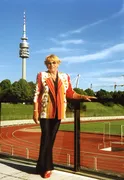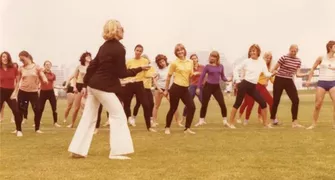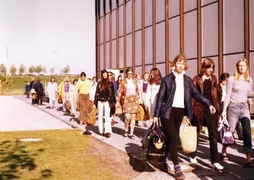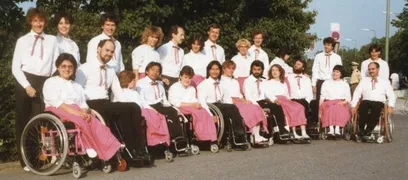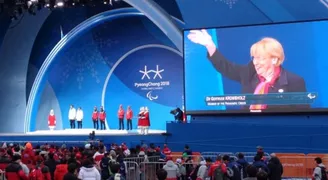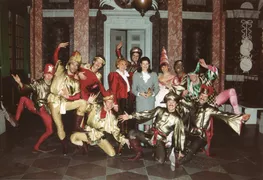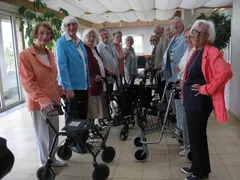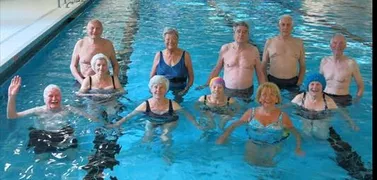It is impossible to imagine the annals of the Department of Sport and Health Sciences without her, and she has shaped sports science education for decades - as head of the sports philology department at the Bavarian Sports Academy with more than 30 semester hours per week in theory and practice, and as deputy head and later head of the sports teacher education department at TUM. She was also head of the department of gymnastics, dance, music and movement. Her name is also familiar to all staff and students due to the endowment of the prize for the best sports science theses of the Department, which has been awarded for 25 years as part of the Absolvia celebration. We are talking, of course, about Dr. Gertrude Krombholz. On July 13, 2023, the physical education teacher and sports scientist will celebrate her 90th birthday, for which the Department of Sport and Health Science extends its warmest congratulations. Happy birthday, dear "Krombine"!
A large number of TV reports, newspaper and magazine articles and essays in anthologies have been written about her life as well as her sporting activities. Last but not least, she was honored by Dr. Martin Pabst in Volume III "Alumni der TUM. Formative Shapers from the Technical University of Munich". She became internationally known through the invention of integrative wheelchair dance, which she developed in 1973 as part of a choreography. Over the decades, the new discipline made her famous worldwide and she visited more than 40 countries in the process. In 2002 she was appointed "Member of the Paralympic Order", which makes her part of the "Paralympic Family". In her role, she has officiated at 16 Paralympic Games since 1984, often taking charge of on-site award ceremonies, most recently in 2018 at the Paralympic Games in Pyeonchang, South Korea.
In the early 1970s, Dr. Krombholz trained as a dance teacher in Nuremberg alongside her professional work. At that time, she was the only dance teacher of the General German Dance Teachers Association (ADTV) at a German university. During the Olympic Games in Munich in 1972, in Innsbruck in 1976 and in Lake Placid/USA in 1980, she worked as chief hostess and co-choreographer for the opening ceremonies and in the ceremonial area.
In 1981, the Senior Academic Director and former head of the sports teacher education at TUM completed her doctoral thesis on "The Development of School Sports and Physical Education Teacher Training in Bavaria from the Beginnings to the End of World War II" summa cum laude. Dr. Krombholz received the Friends of TUM Award for the best doctoral thesis in 1982 for this work, which consisted of a total of 3,584 pages. The publication of the dissertation as part of the New Series of Publications of the Munich City Archives was shortened to 617 pages.
For her life's work, Dr. Krombholz was awarded, among others, the Federal Cross of Merit on Ribbon (1991), the Golden Ring of Honor of TUM (1997), the Bavarian Order of Merit (1998), the Golden Badge of Honor of TUM (1998), the Badge of Honor of the German Disabled Sports Association (2002) and the Golden Ring of Honor of the City of Munich (2007). She also received the Bavarian Sports Award in the category "Innovation in Sports" in 2002 for her invention of integrative wheelchair dancing.
For her birthday interview, "Bewegungsmensch" Dr. Krombholz invited to Dießen am Ammersee, where she has lived in the Augustinum senior citizens' residence since 2006. There, she introduced the rollator dance in 2012, which she still practices every two weeks with the residents during a dance lesson in the winter garden on the eighth floor of the Augustinum. Last year, she celebrated her tenth anniversary with the dance group.
Dear Dr. Krombholz, the Department of Sport and Health Sciences would like to congratulate you on your 90th birthday. How are you?
Dr. Gertrude Krombholz: "I haven't really registered that I'm supposed to be 90 years old already. When I look at my desk and my computer and everything there is to do, I can't believe it at all and still feel 20 years behind. You should definitely be happy with what you're given every day and be thankful to the Lord God that you still get to experience it like this."
You're celebrating your 90th birthday, and the Department of Sport and Health Sciences is also celebrating an anniversary....
Dr. Gertrude Krombholz: "We are celebrating 50 years of sports at TUM this year! In 1973, the Bavarian Sports Academy and the University Institute for Physical Education were transferred to TUM as the Sports Center and Central Institute for Sports Science. And we are even celebrating 150 years of gymnastics teacher training in Munich, following the founding of the Königliche Zentralturnlehrerbildungsanstalt in 1872 and the first recognized examination for gymnastics teachers in 1873. Secretly, we are even older than the TUM itself, after the Royal Public Gymnastics Institute was founded at the University of Munich as early as 1828. Here we can then already celebrate 200 years of existence in five years."
Even at the age of 90, you're still alive and kicking. What is your secret?
Dr. Gertrude Krombholz: "With life here at the Augustinum, with all the facets that the home offers, you can definitely grow old. I was in the swimming pool for three quarters of an hour this morning and I go aqua jogging, because that is one of the best exercises for me. It was a shame that there was a standstill for almost two years because of the Corona period. But there is an exercise pool here. It costs a little bit, but I treated myself to that during that time. And I attach great, great importance to daily exercise time. I would also like to pass this on to all my dear friends and acquaintances: Make sure you move in some way every day! Just as my life has been moving."
Why did you decide to move to the Augustinum senior residence in Dießen am Ammersee?
Dr. Gertrude Krombholz: "A group of students I taught in Marquartstein, first as a trainee teacher and then later as a young teacher in chemistry, was responsible for this. That was my favorite class, which I also had as a supervising class. When this group celebrated its 40th Abitur anniversary in 2002, I was invited and one of my former students was the director of the Augustinum at Ammersee at the time. His wife advised me to register there immediately if I was interested, since there was a ten-year waiting period. 14 days later I drove here and filled out a preliminary contract. In 2006 I had an accident in my apartment in Nymphenburg and from then on I could no longer live there alone. In the Schwabing hospital I had the idea to move to Dießen immediately. Fortunately, after a phone call, it worked out right away, and that's how I finally ended up here."
You invented integrative wheelchair dancing in 1973 and introduced rollator dancing at the Augustinum in 2012. How did you come up with such ideas?
Dr. Gertrude Krombholz: "They were always spontaneous ideas. In the run-up to the rollator dance, there was a social event here at the Augustinum where people also danced. A tango was played and a lady with a rollator, who had lived in Argentina for a long time, suddenly jumped up and danced with her rollator. And I thought to myself: That's great! We could really dance with the rollator! That was the start of the dance group. I then registered all the ladies and gentlemen with rollators. Not all of them came, but the majority did, some of them already over 90 years old."
In the course of performances at sports and dance events, you have traveled to many countries over the decades. Which ones did you particularly enjoy?
Dr. Gertrude Krombholz: "You have to distinguish between the people who live there and the countries that give you a lot culturally and scenically. In terms of enthusiasm and excitement, one group of people impressed me the most - the Argentines! They are characterized above all by warmth, solidarity and a never-ending enthusiasm. This is certainly also due to their southern temperament. The country that has fascinated me most culturally is Cambodia. However, I experienced Cambodia in 1967, when the war had not yet broken out. At that time, I still had to get a visa in Thailand and I traveled through the country by local bus. I got to know it still in its original and pristine state - without tourism. I don't know what it's like there today, with tourist group after tourist group passing through."
What do you remember most from all those trips?
Dr. Gertrude Krombholz: "The nice thing is that I made friends everywhere, especially in Asia. In Japan, Hong Kong, Malaysia, the Philippines or even Singapore, there was very intensive and focused dancing. I still have friends there that I have been able to keep to this day. Also to the Eastern Europeans I always had a cordial contact. I also experienced an incredible amount of hospitality there. You must not forget that. They are people like you and me. People helped where help was needed. Many of them were also guests here in Dießen, including people from Belarus and Japan. Corona, however, has of course torn many gaps."
How did you experience the Corona period at the Augustinum?
Dr. Gertrude Krombholz: "We got through it quite well. Precautionary measures were taken, which of course had to be done in such a house. This was also followed very uniformly. People realized that they had to stick to it. I myself have been spared so far, thank God."
Thank you very much for the interview and all the best!
Text: Romy Schwaiger
Photos: Dr. Gertrude Krombholz
